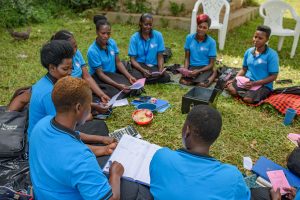A View from the Frontline: Gender Equality in Uganda
International Women’s Day (Sunday 8 March) is an opportunity to celebrate the accomplishments of women, and commit to making sure no-one is left behind in pursuit of the United Nations Sustainable Development Goal of achieving gender equality around the globe. However, in sub-Saharan Africa, where mothers2mothers (m2m) works, securing equal rights for women is more often than not an uphill battle. African women face profound gender inequality—they are more likely than men to live in poverty, face job insecurity, and experience sexual and physical violence.*

Teddy Atim
To explore these challenges and how m2m is working to advance gender equality, we spoke with m2m Spokeswoman Teddy Atim, a 25-year-old mother of three who lives in a rural community in Uganda. She knows just how vulnerable many women in her country are, having been neglected by her husband and family when she was diagnosed with HIV during her first pregnancy five years ago.
Teddy also knows how Mentor Mothers—women living with HIV whom are employed and trained by m2m—can lift women up and make sure no-one in their community is left behind in accessing vital health services. After Mentor Mothers helped educate Teddy’s husband and family about HIV, they supported her to access treatment that protected her child from HIV infection and kept her healthy. Now as a Mentor Mother herself, Teddy is a driver of change and a valued member of her family and community. She works tirelessly to help other women overcome the challenges she once faced and create bright futures for themselves and their families.
What challenges do women in Uganda face in achieving gender equality?
In Uganda, men rule everything and women cannot do anything but obey the rules. One of the main reasons is that many women have a low level of education. Due to poverty, most families prefer to send their sons to school, instead of their daughters. They see girls as a liability because they will get married and leave their home to build other families. Illiteracy means women cannot find jobs and they become even more dependent on men.
Are women able to make decisions about their own health?
Fortunately, women in Uganda do not have to bring their husbands or partners when they visit a clinic for healthcare, but it can be difficult for them to reach the nearest clinic. Our communities are quite spread out and women often have to travel long distances and pay for transportation to get there. Since most women are financially dependent on their husbands, the husbands decide whether to give them transport money to go to the clinic.
How does m2m help empower women to take control of their own health?
As Mentor Mothers, we educate women about important health issues and support them to access vital health services and take control of their health. We support women to disclose their status to their husbands and educate male partners about the importance of treatment. We also teach and encourage women to be self-reliant and find ways to earn money for transport to the health centre, like selling vegetables from the family farm. But when all else fails and they don’t have access to money, we have a transport voucher system to pay for their transport to and from the clinic for appointments.
How is m2m promoting women’s rights in Uganda?
m2m helps create economic empowerment opportunities by employing women living with HIV, like me, as Mentor Mothers. The employment enables us to provide for our families, build our homes, and pay for our children’s school fees so they can have better opportunities in life.

Mentor Mothers in Uganda review finances for their Village Savings and Loan Association.
We have also started Village Savings and Loans Associations (VSLA) at m2m in Uganda through which Mentor Mothers and other women in their communities come together to save money. We use our savings to provide loans to one another so women can start small businesses and generate income. Through the VSLA, I was able to open a small grocery store that sells basic household goods to my community.
When women start earning money, their husbands start treating them with more respect and they also begin to be seen as important people in the community. I am now a driver of change in my family and my community. My family is healthy and thriving as a result.
What message do you want to share this International Women’s Day?
There is a lot that still needs to change in Uganda, starting with how society treats women. We need to start raising our girls the same way we raise boys. Society in Uganda must make it important for girls to get an education, not just raise them to be someone’s wife. Once we do that, women will know that they are more than just mothers and wives, they will become leaders, change-makers, and they will raise more of these kinds of women.
Through the work of m2m, women in my community have become the pillars in their homes and have the power to make informed decisions about their lives. These strong women teach younger women and girls that they are equal to men. This is what I live for—to see this kind of change happen in my lifetime.
*African Human Development Report 2016, United Nations Development Programme






















